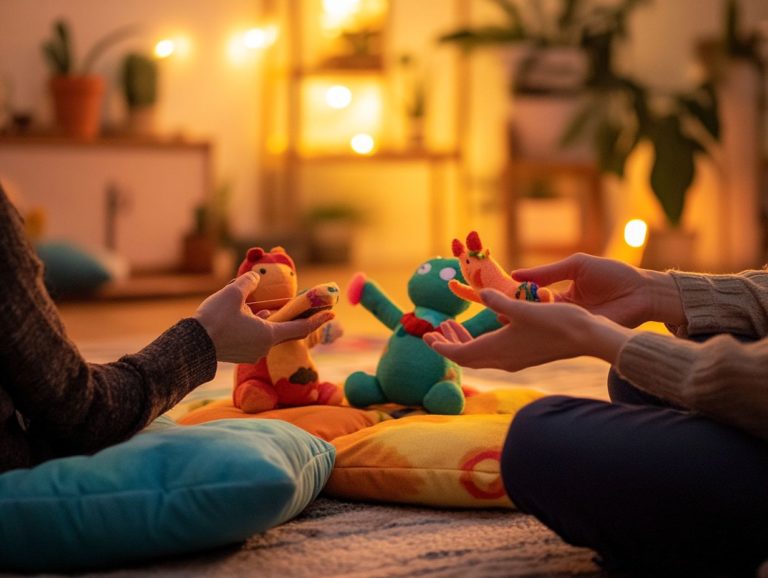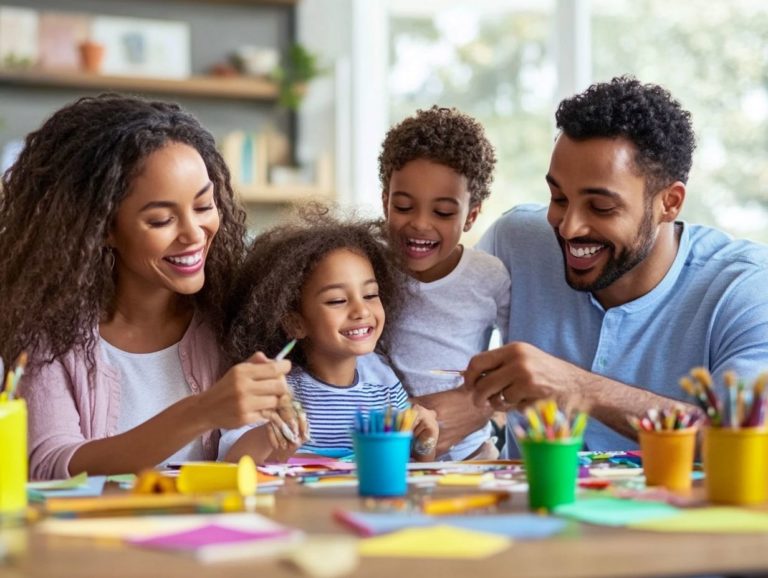Mindful Playdates: Ideas for Engaging Kids
Contents
- Mindful Playdates: A Guide for Parents and Caregivers
- Key Takeaways:
- 1. Nature Scavenger Hunt
- 2. Art and Craft Activities
- 3. Sensory Play
- 4. Cooking and Baking Together
- 5. Indoor Obstacle Course
- 6. Board Games and Puzzles
- 7. Music and Dance Party
- 8. Science Experiments
- 9. Role-Playing Games
- 10. Outdoor Water Play
- How Can Mindful Playdates Benefit Children?
- Frequently Asked Questions
Mindful Playdates: A Guide for Parents and Caregivers
In a world where screens frequently overshadow playtime, mindful playdates present a delightful alternative that nurtures creativity, connection, and skill development among children. These playdates incorporate being present activities, enhancing focus and emotional well-being.
This article delves into ten captivating activities from nature scavenger hunts to hands-on science experiments that spark imagination, foster meaningful interactions, and integrate mindful activities suitable for children.
You ll also uncover the myriad benefits of mindful playdates, gain valuable tips for parents and caregivers, and explore age-appropriate activities designed to enhance social skills and improve mental health.
Let s make playdates fun and unforgettable!
Key Takeaways:
- Nature scavenger hunts are a great way to engage kids and encourage exploration of the natural world.
- Art and craft activities stimulate creativity and help children develop fine motor skills while fostering mindfulness and self-expression.
- Sensory play allows children to engage their senses and enhance their cognitive development while promoting relaxation and mindfulness.
1. Nature Scavenger Hunt
A Nature Scavenger Hunt is not just any outdoor activity; it s an engaging and educational mindfulness experience that captivates children while nurturing how children feel and express their emotions and enhancing focus. As they embark on this mindful exploration, they ll connect with nature, sparking a sense of curiosity and awareness that promotes feeling good inside. This activity can be tailored to various age groups, including preschoolers, making it a versatile choice for you as a caregiver or educator looking to weave mindful activities into playtime.
To organize a successful Nature Scavenger Hunt, start by selecting a serene outdoor location, whether it s your backyard, a local park, or a scenic nature trail. Create a list of specific items for the children to find, such as:
- different types of leaves
- interesting rocks
- unique flowers
Pairing this hunt with mindful exercises, like taking deep breaths or listening quietly to the sounds of nature, can significantly enhance the experience. These moments help children focus better and manage their feelings.
Lead by example and show them how to interact with nature mindfully by noticing colors, textures, and smells. This approach fosters social skills as children work together and share their findings. It also provides an excellent opportunity to address any attention challenges they may face, helping them learn to calm their minds and engage more fully with their surroundings.
2. Art and Craft Activities
Art and craft activities are powerful tools for mindfulness, as supported by research from experts like Flook et al. and Crescentini, Capurso, Furlan, Fabbro.
These activities offer children a unique avenue to express their creativity while enhancing focus and self-regulation through the meditative nature of creation. This approach is endorsed by mindfulness experts like Karen Young and organizations such as Mindful Schools.
By incorporating mindful breathing techniques before diving into these art projects, young creators can ground themselves in the present moment, setting the stage for deeper emotional engagement. These preliminary exercises invite children to concentrate on their breath, calming their minds and preparing them for the task at hand. Techniques from mindfulness training programs such as Smiling Minds can be particularly effective here.
As they immerse themselves in the act of creation whether it s painting, sculpting, or drawing they learn to channel their emotions into tangible forms. This fun process helps kids express themselves and understand their feelings better, ultimately contributing to improved mental health over time. This method can be particularly beneficial for preschoolers.
3. Sensory Play
Sensory play is an excellent way to incorporate mindfulness activities, particularly for children with attention problems and ADHD.
Sensory play serves as a remarkable avenue for weaving mindfulness activities into a child’s daily routine. It engages their senses and nurtures an awareness of the present moment through textures, sounds, and aromas. Research from experts like Flook et al. and Crescentini, Capurso, Furlan, and Fabbro supports this approach.
For example, you might consider activities such as:
- playing with water beads
- creating DIY sensory bins filled with rice or beans
- exploring fragrant herbs each offering a refreshing yet calming experience.
As a caregiver, you have the opportunity to enhance these moments by guiding children through mindful breathing exercises, prompting them to take deep breaths while feeling the coolness of the water beads or the warmth of the rice in their hands. This method aligns with mindfulness meditation techniques promoted by experts like Eckhart Tolle.
This practice not only sharpens their focus on these sensations but also imparts valuable techniques for managing emotions. The emotional benefits of sensory play are particularly profound for preschoolers, as these activities can improve their self-control skills, reduce anxiety, and foster a sense of security and well-being. It also addresses attention problems that children might face.
4. Cooking and Baking Together
Cooking and baking together presents a unique opportunity for you to engage in mindfulness exercises with children. As they measure, mix, and taste, they become immersed in the present moment, which significantly enhances their emotional development and nurtures vital social skills. Engaging in these mindful activities serves as effective anxiety coping methods for children.
By diving into simple and enjoyable recipes, such as no-bake cookies or vibrant fruit kabobs, you allow them to unleash their creativity while grasping essential concepts like patience and teamwork. These delightful activities can serve as a gentle distraction from everyday anxieties, transforming your kitchen into a sanctuary for heartfelt conversations about emotions.
As children scoop, stir, and sprinkle, they’re not just honing their culinary skills; they’re also developing their capacity to express feelings and share experiences.
Incorporating tasks like selecting ingredients or decorating baked goods gives young minds power, fostering a profound sense of accomplishment and connection during these mindful cooking sessions.
5. Indoor Obstacle Course
An indoor obstacle course serves as a dynamic mindfulness game, inviting you to challenge children as they enhance their focus, improve self-control, and develop essential problem-solving skills while completing different physical challenges. This type of activity is particularly beneficial for children with ADHD, helping them channel their energy and improve their concentration.
This engaging activity promotes physical fitness and provides a prime opportunity to weave in mindfulness practices. By setting up various stations where children can pause and take deep breaths before tackling each challenge, they can learn to center their thoughts and emotions effectively.
Techniques such as visualizing success at each obstacle or employing a simple mantra can significantly help maintain concentration and alleviate anxiety.
Creating a reward system for completing tasks allows kids to bask in a sense of achievement, reinforcing positive behavior and encouraging perseverance. This approach is especially beneficial for those navigating attention difficulties, giving them the power to thrive.
6. Board Games and Puzzles
Board games and puzzles do more than just entertain; they serve as powerful mindfulness activities that foster social skills and emotional well-being. By engaging in cooperative play and thoughtful decision-making, children not only have fun but also cultivate essential life skills. Kid-friendly mindfulness games like these can significantly improve a child’s mindfulness awareness and interpersonal abilities.
Consider games like The Mind and Pandemic . These require players to collaborate while attuning themselves to one another s emotions and thoughts, effectively nurturing a sense of teamwork and empathy. Similarly, collaborative puzzles offer a shared sense of achievement, enhancing communication skills as children strategize and negotiate their roles.
Mindfulness activities, including coloring books or the game Gratitude , encourage children to reflect on their feelings, allowing them to express themselves more freely. By weaving these mindful practices into playtime, children can refine their social interactions and develop emotional intelligence, setting a solid foundation for their future relationships.
7. Music and Dance Party
Have you ever thought about how a music and dance party can engage children in mindfulness practices? It allows them to express themselves freely and enjoy the emotional benefits that come with movement and rhythm. This activity can also serve as an effective anxiety coping method, providing a fun and expressive outlet for children’s emotions.
By integrating structured yet playful activities that promote creative movement, you can guide children in focusing their thoughts and uplifting their moods. Simple exercises, such as dancing to calming music or engaging in improvisational games that explore various emotional states, can foster self-awareness. As they move, children learn to connect with their feelings, enhancing their emotional regulation.
Offering cues like encouraging them to move like animals or stretch like trees not only sparks imaginative play but also deepens their connection to their bodies. This approach inspires joy and lays the foundation for enduring mindfulness practices.
8. Science Experiments
Engaging in science experiments with children is an exciting way to practice mindfulness! It elevates their focus and encourages the use of mindfulness techniques to observe and reflect on the scientific process. Incorporating mindfulness meditation practices during these experiments can further enhance the experience, making it both educational and emotionally enriching.
By incorporating simple experiments, such as creating a vinegar and baking soda volcano or exploring the growth of beans under different conditions, you can help kids learn by doing and ignite their curiosity. As children immerse themselves in these activities, they have the opportunity to practice deep breathing and conscious observation, honing in on their senses whether it’s the delightful fizzing sound or the captivating sight of sprouting plants.
These mindfulness activities are particularly beneficial for children’s mindfulness, helping them enhance their focus and improve mental health. This approach not only transforms learning into a joyful adventure but also nurtures patience, self-regulation, and awareness qualities that are vital for understanding the world around them, contributing significantly to their emotional development.
9. Role-Playing Games
Engaging in role-playing games can effectively nurture mindfulness in children, providing them with the opportunity to develop essential social skills and emotional advantages as they step into various characters and scenarios. These mindfulness practices can be particularly helpful for children with attention problems or anxiety, offering psychological wellbeing.
Through these imaginative experiences, children are encouraged to express their thoughts and feelings in a safe environment, which can help alleviate anxiety and enhance their emotional intelligence. As a caregiver, you can facilitate these activities by crafting structured yet flexible scenarios that reflect real-life situations, guiding children to explore diverse perspectives. According to Mindful Schools and Smiling Minds, such approaches contribute to overall psychological well-being.
Encouraging an open dialogue before and after the sessions will give children the power to articulate their emotions and thoughts more clearly. This practice is crucial for their emotional development and psychological wellbeing. Additionally, incorporating breathing exercises or calming strategies between role plays can ground participants, reinforcing the vital connection between mindfulness and emotional development.
10. Outdoor Water Play
Outdoor water play presents a wonderful opportunity for you to guide children into mindfulness activities, especially for preschoolers. They can immerse themselves in the sensory richness of water while practicing mindful breathing in a playful environment.
Engaging in activities like water balloon tosses, splashing in small inflatable pools, or experimenting with floating toys not only brings joy but also enhances their ability to focus on the present moment. These mindfulness exercises are particularly effective for children mindfulness and can help enhance focus and improve mental health. These playful experiences encourage children to observe the dance between water and their surroundings, cultivating a deeper awareness of their feelings and sensations.
By incorporating structured moments of reflection such as prompting them to describe how the water feels or how their bodies move you can further promote emotional benefits. This approach nurtures self-awareness and helps them develop a positive relationship with their emotions during play, enriching their overall experience.
How Can Mindful Playdates Benefit Children?
Mindful playdates present a wealth of benefits for children, enhancing their social skills and emotional well-being while introducing mindfulness practices that nurture self-regulation and attention management.
These gatherings create a unique space for your child to explore their emotions and thoughts while interacting with peers, which can be particularly beneficial for children with ADHD. This setting allows for Kid-friendly mindfulness that can be particularly beneficial for children struggling with ADHD. For example, engaging in activities like mindful breathing exercises or nature walks can foster cooperation, as participants learn to be present and aware of their surroundings together. Games that promote sharing and taking turns become invaluable tools for helping children navigate their feelings of frustration and joy, ultimately boosting their emotional intelligence.
As a caregiver or educator, you can easily weave these practices into playdates by incorporating simple mindfulness exercises, such as guided imagery or yoga, into the agenda. These mindfulness techniques are recommended by experts like Karen Young and Eckhart Tolle. Allowing time for open discussions also gives children the power to articulate their feelings, enhancing their communication skills and deepening their connections with friends. These conversations can help them develop better coping methods for anxiety.
What Are Some Tips for Creating a Mindful Playdate?
Creating a mindful playdate means weaving in mindfulness practices and techniques that nurture emotional development and encourage children to be fully present and engaged in their interactions.
To create a calm and peaceful environment, it s essential to begin by setting clear intentions for the playdate, emphasizing the importance of being present. You might consider incorporating activities like mindful storytelling, where children can listen intently and reflect on a narrative.
Alternatively, you could embark on nature walks that invite them to observe and appreciate their surroundings, significantly enhancing their focus. Integrating simple breathing exercises or yoga stretches can be an excellent way to help manage attention challenges, allowing the kids to reset and refocus effectively.
Encouraging open discussions about feelings helps children express themselves emotionally. This approach not only fosters emotional growth but also cultivates deeper connections among peers, enriching their social experience.
How Can Parents and Caregivers Encourage Mindful Play?
As a parent or caregiver, you hold a pivotal role in nurturing mindful play by introducing mindfulness exercises and cultivating an environment that fosters emotional well-being and effective anxiety management for children.
By seamlessly weaving simple activities into daily routines, you can guide your children toward greater awareness of their thoughts and feelings. For instance, practicing breathing techniques together during quiet moments can significantly enhance their focus and instill a sense of calmness.
Engaging in sensory-rich experiences, such as nature walks or mindful eating, allows your children to fully immerse themselves in their surroundings, encouraging appreciation for the little things that often go unnoticed.
Mindfulness games like ‘I Spy’, focusing on sounds or textures, can inspire your children to observe their environment with heightened attention, nurturing a deeper connection to their everyday experiences. Try these activities today to see the difference they can make!
What Are Some Mindful Activities for Different Age Groups?
Mindful activities can be tailored to various age groups, ensuring that children at all developmental stages, from preschoolers to older kids, reap the benefits of engaging mindfulness practices that nurture emotional growth.
For instance, preschoolers might find joy in simple breathing exercises combined with imaginative storytelling. This method helps them imagine peaceful places while concentrating on their breath.
In contrast, older children can delve into more structured activities like guided meditation, which is a practice where someone leads you through calming thoughts and images, or journaling about their feelings, encouraging a deeper understanding of their emotions.
Incorporating sensory experiences, such as nature walks where children observe and describe their surroundings, offers both younger and older children a delightful way to practice mindfulness that resonates with their interests and cognitive levels.
How Can Mindful Playdates Help Children Develop Social Skills?
Mindful playdates can profoundly enhance your child’s social skills, offering them valuable opportunities to engage in practices that cultivate empathy, cooperation, and emotional growth during their interactions.
By participating in activities that emphasize presence and awareness, your child can gain a deeper understanding of their own feelings, as well as those of their peers, creating a more harmonious social atmosphere.
As a caregiver, you have the ability to facilitate these enriching interactions by designing structured yet flexible playtime that incorporates mindfulness exercises. Consider taking deep breaths together before diving into play or using storytelling to explore various perspectives.
According to research by Crescentini, Capurso, Furlan, and Fabbro, such practices contribute to improved mental health and social skills. Holding gratitude circles at the end of a playdate strengthens friendships and fosters a sense of community.
In this way, these mindful experiences not only enhance your child’s social abilities but also elevate their emotional intelligence, contributing to their overall psychological well-being.
What Are Some Mindful Alternatives to Screen Time During Playdates?
This article explores the concept of mindful playdates and offers practical ideas and benefits for children and parents. Offering mindful alternatives to screen time during playdates allows you to cultivate an environment where children can engage in activities that promote mindfulness, enhance emotional well-being, and provide effective ways to handle anxiety.
These activities can be particularly beneficial for children with ADHD, offering them strategies to manage their symptoms. By introducing captivating mindfulness games think guided imagery exercises or nature scavenger hunts you enable children to develop a greater appreciation for their surroundings while also fostering a deeper awareness of their thoughts and feelings.
Encouraging practices like mindful breathing or simple yoga poses not only add an element of fun but also provide calming techniques to help them process emotions, reduce stress, and cultivate patience. These mindfulness techniques are supported by organizations like Mindful Schools.
Activities like collaborative art projects or sensory play with materials like sand and clay can ignite their creativity while building connections among peers, allowing them to express themselves freely within a nurturing environment. These activities are particularly beneficial for mindfulness for preschoolers, helping them build emotional and social skills from a young age.
Frequently Asked Questions
What Are Mindful Playdates?
Mindful playdates are intentional gatherings for children that focus on promoting mindfulness and engaging activities. These sessions often incorporate mindfulness practices and mindfulness meditation to help children develop better emotional and social skills.
Why Are Mindful Playdates Important?
Mindful playdates can help children develop important skills such as self-awareness, emotional regulation, and empathy. Start incorporating these techniques today to see positive changes in your child’s behavior. This approach is supported by research from Flook et al. and provides essential benefits for children’s emotional development.
What Are Some Ideas for Engaging Kids During Playdates?
Some ideas for engaging kids during playdates include nature walks, art projects, yoga or mindfulness exercises, and group games or challenges. Incorporating mindfulness activities like mindful breathing or mindfulness games can enhance focus and improve mental health.
These activities are beneficial for children and can aid in developing social skills and self-regulation.
How Can I Incorporate Mindfulness into Playdates?
You can incorporate mindfulness into playdates by setting a calm and welcoming atmosphere, practicing deep breathing or relaxation exercises, and encouraging activities that promote focus and awareness. Utilizing mindfulness techniques from experts like Eckhart Tolle or resources from Mindful Schools and Smiling Minds can be especially effective.
Mindfulness practices can help children manage anxiety and attention problems.
How Can I Involve Parents in Mindful Playdates?
You can involve parents and educators in mindful playdates by inviting them to participate and join in on activities, sharing resources and information about mindfulness, including children s mindfulness and mindfulness meditation, and encouraging them to continue practicing mindfulness at home with their children.
Authors like Karen Young and researchers like Flook et al. provide excellent resources for parents.
Are Mindful Playdates Only for Younger Children?
No, mindful playdates can benefit children of all ages. However, the activities and approach may vary depending on the age and developmental stage of the child. For mindfulness for preschoolers, activities should be simple and engaging to fit their developmental stage.
Mindfulness training can also be tailored to older children, potentially including mindfulness exercises to help with ADHD or ways to handle anxiety. Researchers like Crescentini, Capurso, Furlan, and Fabbro have shown that such practices can enhance psychological well-being and emotional development.





